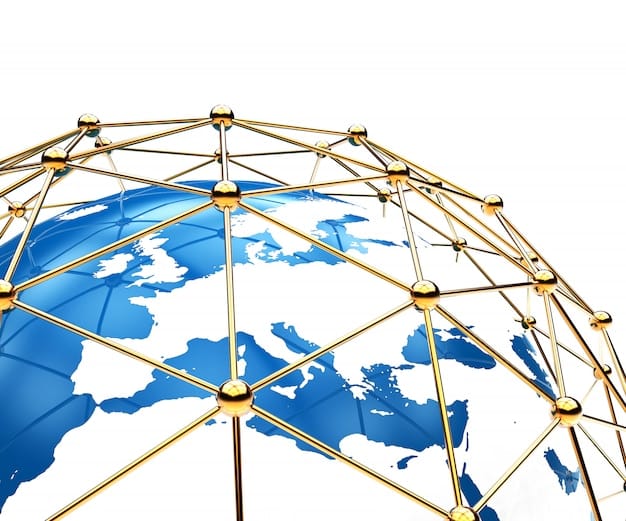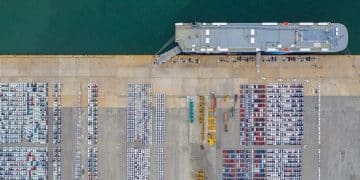Decoding US Foreign Policy Shift: Impact on Global Stability

Decoding the latest US foreign policy shift involves understanding its multifaceted implications for global stability, examining economic, political, and security dimensions to assess the potential impacts on international relations and various regions worldwide.
The landscape of international relations is ever-evolving, with the United States playing a pivotal role in shaping global dynamics. Decoding the latest US foreign policy shift: what it means for global stability requires a comprehensive understanding of the underlying motivations, strategic implications, and potential consequences for nations across the globe. This article delves into the nuances of recent policy changes, offering insights into their potential impacts on various aspects of international affairs.
Understanding the core tenets of US foreign policy
US foreign policy is built upon a complex framework of principles and objectives that guide its interactions with the rest of the world. These core tenets are shaped by a range of factors, including domestic political considerations, economic interests, and national security concerns.
Historical context
Understanding the historical context of US foreign policy is crucial for interpreting current shifts. From isolationism to interventionism, the US has navigated a complex path in its engagement with the world.
Key objectives
The key objectives of US foreign policy often include promoting democracy, fostering economic growth, ensuring national security, and maintaining stability in key regions. These objectives are pursued through a variety of diplomatic, economic, and military tools.
- Promoting democracy and human rights globally.
- Ensuring access to key markets and resources.
- Combating terrorism and other transnational threats.
- Maintaining strong alliances with key partners.
By understanding the historical context and key objectives, we can better assess the impact of recent policy shifts on global stability.
The drivers behind the policy shift
Several factors are driving the latest shifts in US foreign policy. These include changes in the global balance of power, evolving geopolitical landscapes, and domestic political pressures.

Geopolitical landscape
The geopolitical landscape is constantly evolving, with the rise of new powers and the shifting of alliances. These changes necessitate adjustments in US foreign policy to maintain its strategic interests.
Economic considerations
Economic considerations play a significant role in shaping US foreign policy. Trade agreements, sanctions, and investment policies are all used to advance US economic interests and exert influence on other nations.
The drivers behind the policy shift are complex and multifaceted, reflecting the dynamic nature of international relations.
Analyzing specific policy changes
Recent policy changes in US foreign policy have touched upon various areas, including trade, defense, and diplomatic relations. A detailed analysis of these changes is essential to understand their potential impact on global stability.
Trade policies
Changes in trade policies, such as the imposition of tariffs and renegotiation of trade agreements, can have significant implications for global trade flows and economic relationships. These policies can create both opportunities and challenges for businesses and economies around the world.
Defense strategies
Shifts in defense strategies, such as changes in military deployments and defense spending, can alter the balance of power in key regions. These changes can also impact the likelihood of conflict and the effectiveness of alliances.
- Increased focus on great power competition.
- Modernization of military capabilities.
- Strengthening alliances in key regions.
- Adjustments to military deployments.
By analyzing specific policy changes in areas such as trade and defense, we can gain a deeper understanding of their potential impact on global stability.
Impact on international relations
The latest US foreign policy shift has far-reaching implications for international relations, influencing alliances, partnerships, and diplomatic engagements worldwide.

Alliances and partnerships
The strength and cohesion of US alliances and partnerships are crucial for maintaining global stability. Changes in US foreign policy can either strengthen or strain these relationships, depending on how they are perceived by partner nations.
Diplomatic engagements
US diplomatic engagements play a vital role in resolving conflicts, promoting cooperation, and advancing shared interests. Shifts in US foreign policy can alter the tone and effectiveness of these engagements.
The impact on international relations is complex and multifaceted, affecting alliances, partnerships, and diplomatic engagements worldwide.
Regional consequences
The regional consequences of the US foreign policy shift vary depending on the specific region and the nature of US engagement. Some regions may experience increased instability, while others may benefit from new opportunities.
Middle East
In the Middle East, changes in US foreign policy can have profound implications for regional security, political dynamics, and economic development. The US has historically played a significant role in the region, and its policy decisions can shape the trajectory of conflicts and alliances.
Asia-Pacific
In the Asia-Pacific region, US foreign policy is closely watched by countries concerned about China’s growing influence. The US seeks to maintain a balance of power and promote stability in the region through its alliances and partnerships.
- Increased competition with China.
- Strengthening alliances with regional partners.
- Focus on maritime security.
- Promotion of free and open trade.
The regional consequences of the US foreign policy shift are complex and varied, depending on the specific region and the nature of US engagement.
The role of soft power and diplomacy
While hard power, such as military strength and economic sanctions, is an important tool in US foreign policy, soft power and diplomacy also play a crucial role in shaping international relations.
Cultural influence
The US wields significant cultural influence around the world, which can be used to promote its values and interests. This cultural influence, often referred to as soft power, can be a powerful tool for shaping perceptions and influencing behavior.
Diplomatic initiatives
Diplomatic initiatives, such as negotiations, mediation, and conflict resolution efforts, are essential for addressing global challenges and promoting peace and stability. The US has a long history of engaging in diplomatic initiatives to advance its interests and resolve conflicts.
The role of soft power and diplomacy is crucial for shaping international relations and promoting US interests in a complex and interconnected world.
Conclusion
In conclusion, decoding the latest US foreign policy shift requires a nuanced understanding of its core tenets, drivers, specific policy changes, impact on international relations, regional consequences, and the role of soft power and diplomacy. By analyzing these various aspects, we can gain a deeper appreciation of the complexities and challenges of US foreign policy in the 21st century.
| Key Point | Brief Description |
|---|---|
| 🌍 Geopolitical Shifts | New powers and alliances reshape US foreign policy. |
| 💰 Economic Factors | Trade, sanctions, and investments drive policy decisions. |
| 🤝 International Relations | US policy impacts alliances and diplomatic engagements globally. |
| 🛡️ Defense Strategies | Changes in military and defense spending affect regional stability. |
Frequently Asked Questions
▼
The primary objectives include promoting democracy, ensuring national security, fostering economic growth, and stabilizing key regions. These goals are pursued through diplomacy, economic measures, and military strategies.
▼
US foreign policy shifts can either strengthen or strain alliances. Consistent and reliable policies tend to reinforce alliances, while abrupt changes or perceived betrayals can weaken them.
▼
Economics is crucial. Trade agreements, sanctions, and investment policies are utilized to advance US economic interests and exert influence on other nations, affecting their economic and political landscapes.
▼
Soft power, including cultural influence and diplomatic initiatives, is vital. It shapes global perceptions and promotes US values and interests through non-military channels, fostering cooperation and understanding.
▼
Regional consequences vary. Some regions may face increased instability, while others might see new opportunities. The impact depends on the specific region’s dynamics and the nature of US engagement.
Conclusion
Understanding the latest US foreign policy shift is essential for grasping the dynamics of global stability. By considering the policy’s objectives, drivers, and consequences across different regions and domains, one can better appreciate its complexity and the challenges it poses to international relations. It is a continuously evolving landscape that demands careful analysis and informed engagement.





